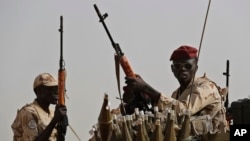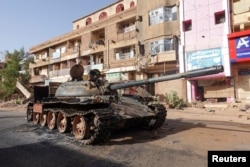The civil war in Sudan is entering its 16th month, with the United Nations estimating more than 15,000 people killed and 11 million displaced due to the ongoing hostilities.
The fighting erupted in Sudan's capital, Khartoum, on April 15, 2023, after weeks of tensions between Gen. Abdel-Fattah Burhan, the commander of the Sudanese Armed Forces, and Gen. Mohammed Hamdan “Hemedti” Dagalo, the head of the Rapid Support Forces.
The two men jointly orchestrated a military coup in 2021 that ousted the military-civilian coalition put in place to transition power back to the civilian government after another wing of the military toppled longtime dictator Omar al-Bashir in 2019.
On July 7, a fresh round of talks started in Cairo, Egypt, between the Sudanese Armed Forces and Rapid Support Forces allies aimed at ending the conflict. The Cairo talks are the latest in a series of international peace initiatives, all of which failed to end the fighting.
Egypt, which backs the Sudanese Armed Forces, has been trying to make progress in closed-door discussions with the United Arab Emirates, which backs the Rapid Support Forces militia, accused of massacring women and children in Darfur.
With the latest peace negotiations in Egypt said to be slowing down, the Association of the Sudanese Abroad, a blue-checked X user blamed the U.S. for the talks’ fiasco.
"US priorities shaped by UAE ties impede effective action on Sudan crisis. By overlooking UAE's hand in war extension, the U.S. fails to match its global speed."
That is misleading.
Since the war broke out two years ago, the United States has made unsuccessful attempts to mediate peace talks between the two sides.
The U.S. Ambassador to the United Nations, Linda Thomas-Greenfield, appealed to the United Arab Emirates and other countries on May 29, urging to stop support for Sudan's warring parties.
Ambassador Thomas-Greenfield warned that al-Fashir, the capital city of North Darfur, Sudan, was "on the precipice of a large-scale massacre."
Last year the United States, Saudi Arabia, and the Inter-governmental Authority on Development (IGAD) initiated talks between the representatives of the Sudanese Armed Forces and Rapid Support Forces in Jeddah, Saudi Arabia.
The United States is also the largest provider of humanitarian aid in Sudan. On June 14, USAID pledged to "provide more than $315 million in additional humanitarian assistance to support the people of Sudan in response to the historic humanitarian crisis."
On the first anniversary of war, Secretary of State Antony Blinken said, the United States will "enhance efforts to hold accountable the perpetrators of war crimes and other atrocities in the RSF and the SAF, including through strengthening sanctions the United States has placed on the individuals, institutions, and other entities responsible for abuses and for fueling the conflict."
On June 6, the U.S. Department of the Treasury’s Office of Foreign Assets Control announced a "blocked pending investigation action" against seven United Arab Emirates-based companies due to their potential involvement in activities violating U.S. sanctions on Sudan, the Sudan Tribune reported.
On May 15, 2024, the State Department sanctioned two senior commanders of the Rapid Support Forces "for leading the Rapid Support Forces (RSF) war campaign."
On June 1, 2023, the U.S. Department of the Treasury's Office of Foreign Assets Control designated four companies for generating revenue from, and contributing to, the conflict in Sudan.
The sanctions targeted Sudan's largest defense enterprise, Defense Industries System, which the Treasury said generates an estimated $2 billion in revenue and manufactures arms and other equipment for Sudan's army.
As the fighting continues to escalate, Russia has been eyeing to build a naval logistics base on the Red Sea in exchange for arms.
In April last year, a CNN exclusive revealed that the Russian Wagner mercenaries had been supplying RSF with missiles to aid their fight against the Sudanese Army Forces.







